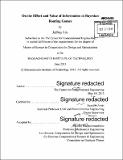On the effect and value of information in Bayesian routing games
Author(s)
Liu, Jeffrey, Ph.D. Massachusetts Institute of Technology
DownloadFull printable version (5.869Mb)
Other Contributors
Massachusetts Institute of Technology. Computation for Design and Optimization Program.
Advisor
Saurabh Amin.
Terms of use
Metadata
Show full item recordAbstract
We consider the problem of estimating individual and social value of information in routing games. We propose a Bayesian congestion game that accounts for the heterogeneity in the commuters' access to information about traffic incidents. The model divides the population of commuters into two sub-populations or types based on their information about incidents. Types-H and L have high and low information about incidents, respectively. Each population routes its demand on an incident-prone, parallel route network. The cost function for each route depends is affine in its usage level and its slope increases with the route's incident state. Both populations (player types) know the demand of each type, route cost functions, and the incident probability. In addition, in our model, the commuters in type-H population receive private information on the true realization of incident state. We analyze both individual cost for each population and the aggregate (social) cost as the type-H population size increases. We observe that, in equilibrium, both these costs are non-monotonic and non-linear as the fraction of the total demand that is type-H increases. Our main results are as follows: First, the information improves individual welfare (i.e., when a commuter shifts from being in the type-L population to the type-H population), but the value of information is zero after a certain threshold fraction. Second, there exist another threshold (lower than the first threshold) after which increasing the relative fraction of type-H commuters does not reduce the aggregate social cost.
Description
Thesis: S.M., Massachusetts Institute of Technology, School of Engineering, Center for Computational Engineering, Computation for Design and Optimization Program, 2015. Cataloged from PDF version of thesis. Includes bibliographical references (pages 52-54).
Date issued
2015Department
Massachusetts Institute of Technology. Computation for Design and Optimization ProgramPublisher
Massachusetts Institute of Technology
Keywords
Computation for Design and Optimization Program.